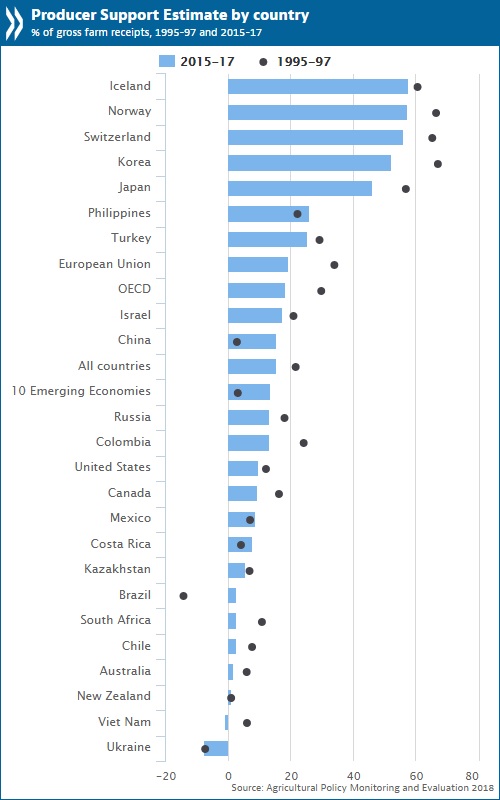
World Bank/Maria Fleischmann Agriculture workers collect carrots on a farm in Chimaltenango, Guatemala.
This article is brought to you in association with OECD.
Most agricultural support policies continue to be poorly aligned with defined objectives, while measures that distort production and trade continue increasing in some countries, according to a new report from the OECD.
 Agricultural Policy Monitoring and Evaluation 2018 shows that the 51 countries included in the report –all OECD and EU countries, plus 10 key emerging economies– provided on average almost USD 620 billion (EUR 556 billion) annually to support agriculture producers during the 2015-17 period. Of this, nearly two-thirds is still provided via measures that strongly distort farm business decisions.
Agricultural Policy Monitoring and Evaluation 2018 shows that the 51 countries included in the report –all OECD and EU countries, plus 10 key emerging economies– provided on average almost USD 620 billion (EUR 556 billion) annually to support agriculture producers during the 2015-17 period. Of this, nearly two-thirds is still provided via measures that strongly distort farm business decisions.
Almost 80% of the total annual government support to agriculture during the period studied was provided to individual agricultural producers, while only a small share (14%) funded general services like research and development or infrastructure, which are needed to equip the agricultural sector for future challenges, according to the report.
A clear focus should be to address the need to increase productivity growth sustainably, enhance environmental performance, especially in the context of a changing climate, and improve farmers’ ability to manage risks from weather, market or other shocks that cannot always be anticipated.
The new OECD report underscores that most agricultural policies today are not well-aligned with these objectives. Progress in lowering support levels and shifting towards less distorting measures remains partial, and is not shared across all countries. Government support to market prices not only harms consumers, especially the less well-off, but also reduces the competitiveness of the food industry itself.
“Removing damaging and distorting policies is an important first step,” said Carmel Cahill, Deputy Director of the OECD Trade and Agricultural Directorate at the launch of the report in Brussels. “Support directly linked to output and input use makes domestic and international markets work less efficiently, encourages environmentally harmful over-use of farm inputs and consumes limited public funds that could be used for more efficient investments in the sector.”
“Countries should re-direct agricultural support to ensure the availability of public services that benefit producers, consumers and society overall,” Ms Cahill said.
Priorities for future spending should include well-functioning agricultural innovation systems, adequate infrastructure and effective and appropriate biosecurity systems, among others, according to the report.
A new report on agricultural policies in India will be released on July 5. Starting in 2019, India will be included in the annual edition of Agriculture Policy Monitoring and Evaluation.




















Leave a Reply